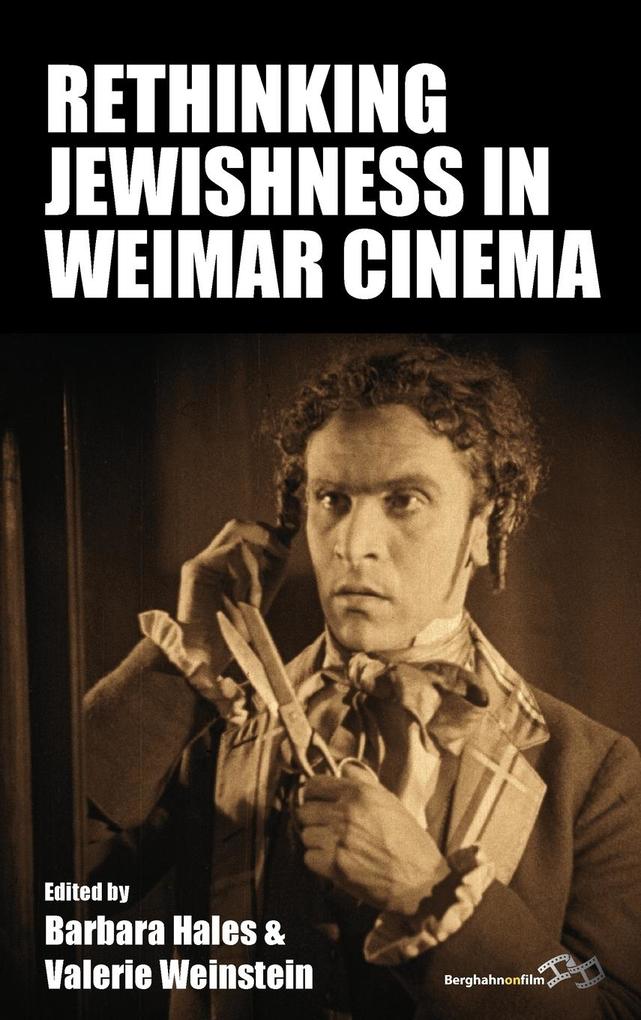
Zustellung: Mo, 16.06. - Do, 19.06.
Versand in 1-2 Wochen
VersandkostenfreiBestellen & in Filiale abholen:
The burgeoning film industry in the Weimar Republic was, among other things, a major site of German-Jewish experience, one that provided a sphere for Jewish "outsiders" to shape mainstream culture. The chapters collected in this volume deploy new historical, theoretical, and methodological approaches to understanding the significant involvement of German Jews in Weimar cinema. Reflecting upon different conceptions of Jewishness - as religion, ethnicity, social role, cultural code, or text - these studies offer a wide-ranging exploration of an often overlooked aspect of German film history.
Inhaltsverzeichnis
List of Illustrations
Acknowledgements
List of Contributors
Introduction: The Jewishness of Weimar Cinema
Barbara Hales and Valerie Weinstein
Part I: Jewish Visibility On and Off Screen
Chapter 1. Humanizing Shylock: The "Jewish Type" in Weimar Film
Maya Barzilai
Chapter 2. Energizing the Dramaturgy: How Jewishness Shaped Alexander Granach's Performances in Weimar Cinema
Margrit Frö lich
Chapter 3. The Jewish Vamp of Berlin: Actress Maria Orska, Typecasting, and Jewish Women
Kerry Wallach
Chapter 4. Jewish Comedians beyond Lubitsch: Siegfried Arno in Film and Cabaret
Mila Ganeva
Chapter 5. Alfred Rosenthal's Rhetoric of Collaboration, the Politics of Jewish Visibility, and Jewish Weimar Film Print Culture
Ervin Malakaj
Part II: Coding and Decoding Jewish Difference
Chapter 6. Two Worlds, Three Friends, and the Mysterious Seven-Branched Candelabrum: Jewish Filmmaking in Weimar Germany
Philipp Stiasny
Chapter 7. Homosexual Emancipation, Queer Masculinity, and Jewish Difference in Anders als die Andern (1919)
Valerie Weinstein
Chapter 8. Der Film ohne Juden: G. W. Pabst's Die freudlose Gasse (1925)
Lisa Silverman
Chapter 9. "The World is Funny, Like a Dream:" Franziska Gaal's Verwechslungskomö dien and Exile's Crisis of Identity
Anjeana K. Hans
Part III: Jewishness as Antisemitic Construct
Chapter 10. Cinematically Transmitted Disease: Weimar's Perpetuation of the Jewish Syphilis Conspiracy
Barbara Hales
Chapter 11. The Einstein Film: Animation, Relativity, and the Charge of "Jewish Science"
Brook Henkel
Chapter 12. "A Clarion Call to Strike Back": Antisemitism and Ludwig Berger's Der Meister von Nü rnberg (1927)
Christian Rogowski
Chapter 13. Banning Jewishness: Stefan Zweig, Robert Siodmak, and the Nazis
André as-Benjamin Seyfert
Chapter 14. Detoxification: Nazi Remakes of E. A. Dupont's Blockbusters
Ofer Ashkenazi
Coda
Chapter 15. "Filmrettung: Save the Past for the Future!": Film Restoration and Jewishness in German and Austrian Silent Cinema
Cynthia Walk
Afterword
Barbara Hales and Valerie Weinstein
Acknowledgements
List of Contributors
Introduction: The Jewishness of Weimar Cinema
Barbara Hales and Valerie Weinstein
Part I: Jewish Visibility On and Off Screen
Chapter 1. Humanizing Shylock: The "Jewish Type" in Weimar Film
Maya Barzilai
Chapter 2. Energizing the Dramaturgy: How Jewishness Shaped Alexander Granach's Performances in Weimar Cinema
Margrit Frö lich
Chapter 3. The Jewish Vamp of Berlin: Actress Maria Orska, Typecasting, and Jewish Women
Kerry Wallach
Chapter 4. Jewish Comedians beyond Lubitsch: Siegfried Arno in Film and Cabaret
Mila Ganeva
Chapter 5. Alfred Rosenthal's Rhetoric of Collaboration, the Politics of Jewish Visibility, and Jewish Weimar Film Print Culture
Ervin Malakaj
Part II: Coding and Decoding Jewish Difference
Chapter 6. Two Worlds, Three Friends, and the Mysterious Seven-Branched Candelabrum: Jewish Filmmaking in Weimar Germany
Philipp Stiasny
Chapter 7. Homosexual Emancipation, Queer Masculinity, and Jewish Difference in Anders als die Andern (1919)
Valerie Weinstein
Chapter 8. Der Film ohne Juden: G. W. Pabst's Die freudlose Gasse (1925)
Lisa Silverman
Chapter 9. "The World is Funny, Like a Dream:" Franziska Gaal's Verwechslungskomö dien and Exile's Crisis of Identity
Anjeana K. Hans
Part III: Jewishness as Antisemitic Construct
Chapter 10. Cinematically Transmitted Disease: Weimar's Perpetuation of the Jewish Syphilis Conspiracy
Barbara Hales
Chapter 11. The Einstein Film: Animation, Relativity, and the Charge of "Jewish Science"
Brook Henkel
Chapter 12. "A Clarion Call to Strike Back": Antisemitism and Ludwig Berger's Der Meister von Nü rnberg (1927)
Christian Rogowski
Chapter 13. Banning Jewishness: Stefan Zweig, Robert Siodmak, and the Nazis
André as-Benjamin Seyfert
Chapter 14. Detoxification: Nazi Remakes of E. A. Dupont's Blockbusters
Ofer Ashkenazi
Coda
Chapter 15. "Filmrettung: Save the Past for the Future!": Film Restoration and Jewishness in German and Austrian Silent Cinema
Cynthia Walk
Afterword
Barbara Hales and Valerie Weinstein
Mehr aus dieser Reihe
Produktdetails
Erscheinungsdatum
01. November 2020
Sprache
englisch
Seitenanzahl
366
Reihe
Film Europa, 24
Herausgegeben von
Barbara Hales, Valerie Weinstein
Verlag/Hersteller
Produktart
gebunden
Gewicht
680 g
Größe (L/B/H)
235/157/24 mm
ISBN
9781789208726
Entdecken Sie mehr
Bewertungen
0 Bewertungen
Es wurden noch keine Bewertungen abgegeben. Schreiben Sie die erste Bewertung zu "Rethinking Jewishness in Weimar Cinema" und helfen Sie damit anderen bei der Kaufentscheidung.




















